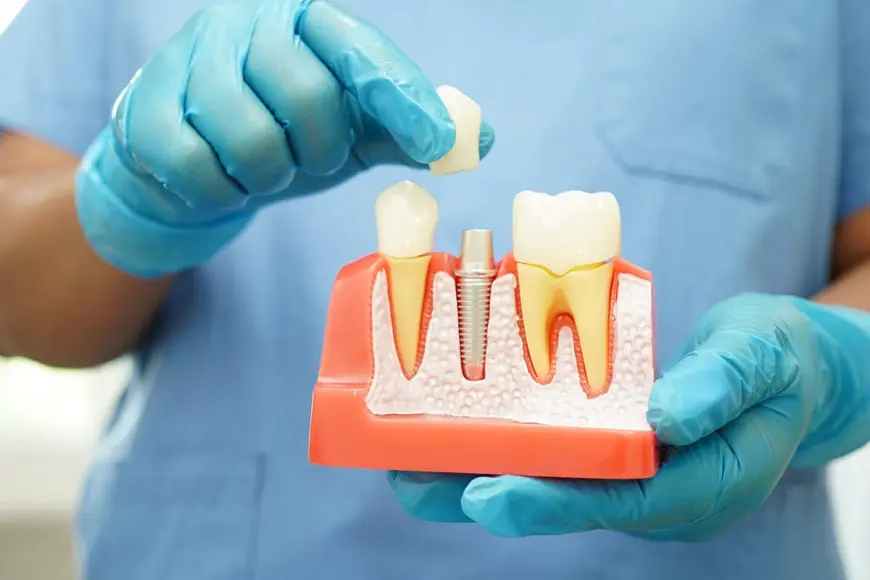Can’t Chew Like You Used To? Implants May Be the Fix
This article explores why chewing difficulties happen and how implants can restore your ability to eat comfortably and confidently.

Difficulty chewing is a common problem that affects many people, especially those with missing teeth or uncomfortable dentures. If you’re struggling to enjoy your favorite foods or feeling self-conscious while eating, dental implants in Dubai might be the effective solution you need. Dental implants provide stable, natural-feeling replacements for missing teeth, allowing you to regain chewing efficiency and improve your overall oral health. This article explores why chewing difficulties happen and how implants can restore your ability to eat comfortably and confidently.
Why Do We Lose Chewing Ability?:
Chewing difficulties often stem from tooth loss or ill-fitting dentures, which can cause discomfort and reduce bite force. When natural teeth are missing, the jawbone begins to shrink, making dentures less stable and chewing less efficient.
Common reasons for reduced chewing include:
-
Missing teeth or tooth extraction
-
Poorly fitting or loose dentures
-
Jawbone loss affecting denture stability
-
Gum disease leading to tooth mobility or loss
-
Aging-related changes in oral function
Understanding these causes highlights why traditional dentures may no longer meet your needs.
How Dental Implants Restore Chewing Function:
Dental implants are titanium posts surgically placed into the jawbone, acting like natural tooth roots. They provide a strong foundation for replacement teeth that function just like your original teeth.
Benefits for chewing include:
-
Increased bite force similar to natural teeth
-
Stable and secure tooth replacement preventing slipping
-
Preservation of jawbone health and density
-
Ability to eat a wider variety of foods comfortably
-
Improved speech and facial structure support
Implants enable you to enjoy meals without worrying about discomfort or denture slips.
Implant-Supported Dentures vs. Traditional Dentures:
For those who currently wear dentures, implant-supported dentures can dramatically improve chewing compared to traditional ones.
Key differences are:
-
Implant-supported dentures snap or screw onto implants for added stability
-
Traditional dentures rely on suction or adhesives that can fail over time
-
Implant dentures allow stronger biting and less gum irritation
-
Easier maintenance and greater comfort with implant-supported options
-
Reduced need for denture adhesives and adjustments
These factors make implant-supported dentures a preferred choice for many patients.
The Implant Procedure and What to Expect:
The dental implant process involves careful planning and several steps to restore chewing ability.
Typical stages include:
-
Initial consultation and 3D imaging to assess jawbone health
-
Surgical placement of implants into the jawbone
-
Healing period allowing implants to fuse with the bone (osseointegration)
-
Attachment of abutments and custom-made crowns or dentures
-
Follow-up visits to adjust and ensure comfort and function
Your dental specialist will guide you through each phase to ensure optimal results.
Who Can Benefit from Dental Implants?:
Dental implants are suitable for most adults experiencing chewing difficulties due to missing teeth or unstable dentures.
Ideal candidates typically:
-
Have sufficient jawbone density or are willing to undergo bone grafting
-
Are in good general health without uncontrolled medical conditions
-
Maintain good oral hygiene and commit to regular dental care
-
Do not smoke or are willing to quit for better healing outcomes
-
Desire a long-term solution to tooth loss and chewing problems
Many patients seeking dental implants in Dubai fit these criteria and achieve excellent outcomes.
Caring for Your Dental Implants to Maintain Chewing Ability:
Proper care after implant placement ensures the longevity of the implants and preserves chewing function.
Essential care tips include:
-
Brushing twice daily with a soft-bristle toothbrush
-
Flossing around implants to remove plaque and food particles
-
Using antibacterial mouthwash as recommended by your dentist
-
Avoiding hard or sticky foods during the initial healing period
-
Scheduling regular dental check-ups and professional cleanings
Good oral hygiene is key to preventing complications like peri-implantitis.
The Cost and Investment in Dental Implants:
While dental implants may have a higher upfront cost than dentures or bridges, their durability and functional benefits often justify the investment.
Financial considerations include:
-
Costs vary depending on the number of implants and complexity of treatment
-
Possible additional expenses for bone grafting or sinus lifts
-
Many clinics offer flexible payment plans or financing options
-
Long-term savings from fewer replacements and repairs compared to dentures
Discussing costs openly with your implant specialist helps you plan for a sustainable treatment path.
Final Thoughts:
If you’re struggling with chewing difficulties, dental implants may be the key to restoring your ability to eat comfortably and confidently. Unlike traditional dentures, implants provide a stable, durable foundation that feels and functions like natural teeth. With improved bite strength, enhanced comfort, and long-term oral health benefits, implants are an investment in your quality of life. For those exploring solutions, dental implants in Dubai offer cutting-edge technology and expert care to help you regain your smile and enjoy meals again without hesitation.
What's Your Reaction?
 Like
0
Like
0
 Dislike
0
Dislike
0
 Love
0
Love
0
 Funny
0
Funny
0
 Angry
0
Angry
0
 Sad
0
Sad
0
 Wow
0
Wow
0

















































